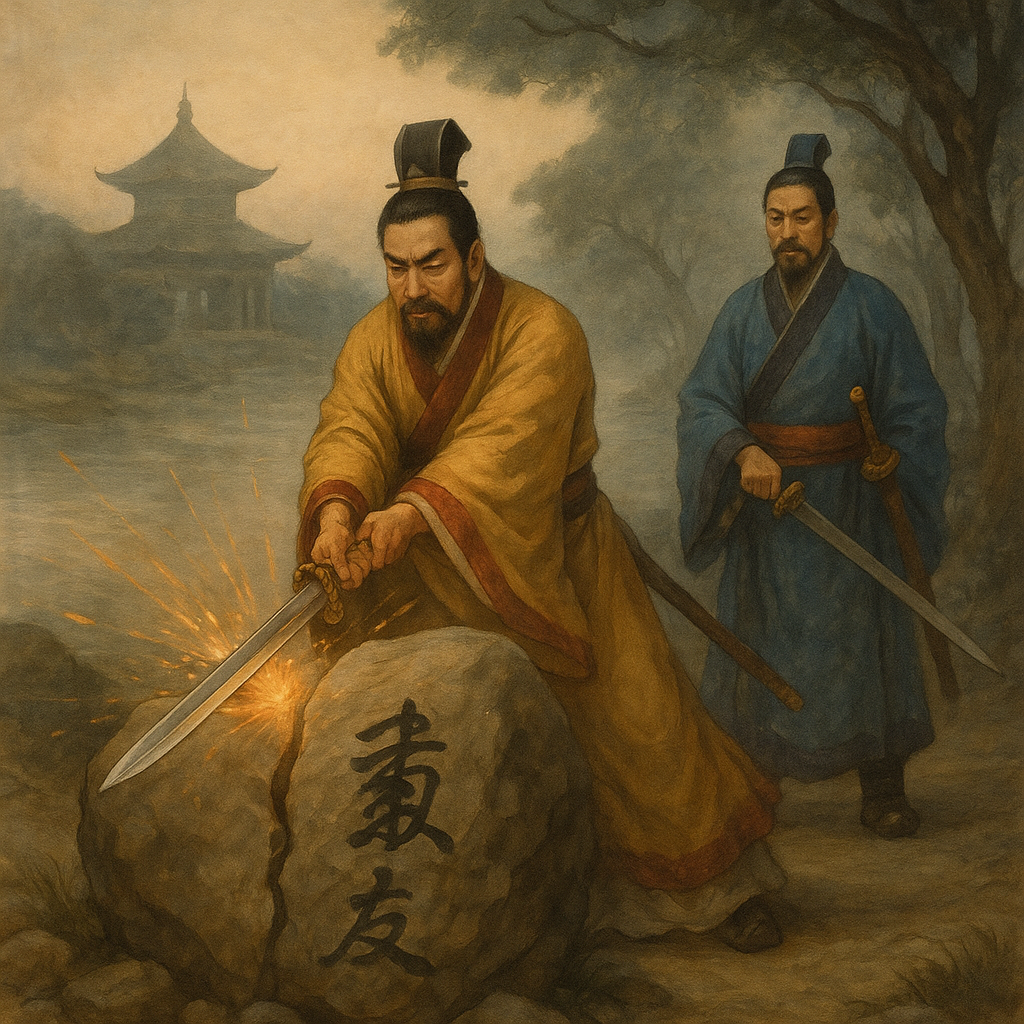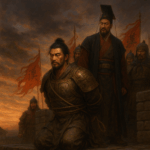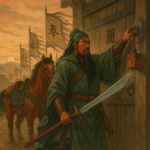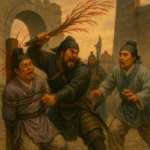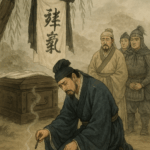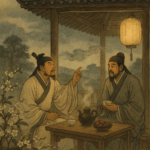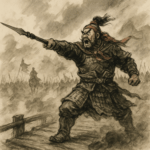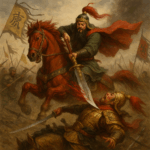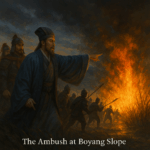When Zhuge Liang learned that Lu Su had arrived, he and Lord Liu set out beyond the city gates to greet him and escorted him to the public residence. After the formal introductions, Lu Su said, “My lord, upon hearing that Your Highness’s son has passed away, I prepared this humble offering and hastened here to pay my respects. Governor Zhou also sends his deepest condolences to Lord Liu and to Master Zhuge.” Liu Bei and Zhuge Liang rose to thank him, accepted the gifts, and invited him to join a banquet. Lu Su continued, “Previously Your Highness said that if your heir were gone, you would return Jingzhou. Now that your son has indeed departed, I trust you will honor your word. May I ask when that might be?” Liu Bei replied, “Please drink first; I would like to discuss this privately.” Lu Su forced down several cups of wine, then pressed once more for an answer. Before Liu Bei could reply, Zhuge Liang’s expression darkened and he interjected sharply, “You, sir, are obstinate and unreasonable—you must be spoken to plainly! Since Emperor Gao’s uprising and the founding of our House, legitimacy should by rights have passed down from the Han—but traitors and usurpers arose, each seizing a piece for themselves. Heaven restores order, and it will return to its rightful heir. Our Lord is a direct descendant of King Jing of Zhongshan, a grandson of Emperor Xiaojing—uncle now to the reigning emperor. Is it not fitting that he should divide up the land? Moreover, Liu Jing’s son has died; it is natural that the younger brother should succeed. As for your master, a mere clerk’s son from Qiantang—what merit has he earned? Yet by force he holds six commanderies and eighty-one prefectures, and still his greed is not sated. He plots to swallow up Han lands. The dynasty belongs to the Liu clan—why should your lord, surnamed Sun, strive to snatch it for himself? Recall the Battle of Red Cliffs: was it only through your Eastern Wu troops that victory was won? Our Lord labored as well, and the other generals obeyed orders just as readily. Had I not borrowed the southeast wind, how could Zhou Lang have devised his stratagem? Once Jiangnan fell, speaking of the Two Qiaos housed in the Bronze Sparrow Terrace was meaningless—your “household nobles” could not have held out. When our lord did not immediately take your point, it was because I considered you a man of wisdom and did not wish to labor the matter. Yet you failed to see!’’
With that, Lu Su was struck silent. After a long pause he murmured, “Zhuge Liang’s words, though harsh, may indeed be just—but there is great disadvantage in my own position.” “What disadvantage?” asked Zhuge Liang. Lu Su sighed, “When Your Highness suffered defeat at Dangyang, it was I who led you across the river to meet Master Kongming. When Zhou Gongjin wished to march on Jingzhou, I blocked him. Again, when you spoke of returning Jingzhou upon your son’s death, I took responsibility. Now you refuse to honor those pledges—how can I report this back? Your master and Zhou Gongjin will surely blame me. I care nothing for death, but I fear angering Eastern Wu and provoking war. Your Highness would find it impossible to hold Jingzhou, and it would be our disgrace.”
Zhuge Liang said, “Cao Cao commands a million troops in the name of the Son of Heaven—I have no fear of that. Why should we tremble before Zhou Lang? If you worry about losing face, then let us draft a temporary agreement: you lend us Jingzhou for now, and when my lord secures new territory, he will return it to Eastern Wu. What say you?”
Lu Su could not conceal his relief and asked, “Where would you take first, then return Jingzhou?”
Zhuge Liang replied, “The Central Plains are in turmoil and not now within our grasp. But Yi Province under Liu Zhang is weak—I intend to campaign there first. Once Yi is secured, we will of course restore Jingzhou.”
Seeing no better choice, Lu Su agreed. Liu Bei himself drafted the document, affixed his seal, and pledged to honor it; Zhuge Liang also signed in guarantee. “Since Liang is also from Your Highness’s circle,” said Zhuge Liang with a wry smile, “I, too, will sign. But please, Mr. Lu, add your signature, so that when you return to see Lord Wu, your face will bear witness.”
Lu Su answered, “I know Your Highness to be a man of honor; I will not break my word.” He signed the document, took his leave, and departed by boat. Liu Bei and Zhuge Liang accompanied him to the riverbank, where Zhuge Liang cautioned him, “When you meet Lord Wu, speak openly and don’t let your mind wander. If he does not accept our agreement, then by Heaven’s command I shall tear up the pledge and seize those eighty-one prefectures for myself. But for now we wish only harmony between the two houses—and we must not give Cao the slightest excuse for mockery.”
Lu Su disembarked and hurried on to Chaisang to meet Zhou Yu. Yu asked, “How did Lu Su handle the matter of Jingzhou?”
Lu Su presented the agreement. Zhou Yu stamped his foot and exclaimed, “Lu Su has fallen into Zhuge Liang’s trap! He calls it a loan but it is a feint. He says he will return Jingzhou once Yi Province is taken—who knows when that will be? Ten years from now, a hundred years from now, still no return! What good is such a document? And you have pledged your own honor to it! If he fails to deliver, what will your lord say?”
Lu Su, aghast, stammered, “I trust Liu Bei not to betray me.” Yu sneered, “Lu Su may be honest, but Liu Bei is a ruthless schemer and Zhuge Liang more cunning than any. I fear you are mistaken in both.”
Lu Su asked, “What then shall I do?”
Zhou Yu replied, “You are my benefactor. Recalling how you once gave me grain in my hour of need, how can I refuse you? Remain here a few days until our spies report—then there may be another way.”
A few days later, a scout returned with alarming news: “Inside Jingzhou, banners of mourning fly over the city, and new graves have been dug outside its walls—soldiers all wear crepe for mourning.” Zhou Yu’s face darkened: “Who has died?”
The scout said, “Lady Gan, Lord Liu’s wife, has just passed away. Her funeral rites are being arranged even as we speak.” Yu laughed and said to Lu Su, “My plan succeeds: with Liu Bei bereaved, Jingzhou will fall into our hands.”
Lu Su asked, “How shall we proceed?”
Zhou Yu explained, “When a man loses his wife, he will seek another. Our lord has a younger sister—known for her courage—surrounded by hundreds of armed attendants. Her rooms are bristling with weapons. Though not a soldier, she is more formidable than many men. We will send word to Jingzhou as if to arrange a marriage—invite Liu Bei to come in person. When he arrives at Nanxu, detained by his own new bride and held in the city jail, we will demand Jingzhou in exchange for his freedom. In all this, you must remain blameless.”
Lu Su bowed his thanks. Zhou Yu penned a letter to Sun Quan, outlining the scheme and enclosed the signed pledge. Sun Quan read it and, though puzzled, nodded with suppressed delight. Suddenly he said, “Only Lü Fan can do this justice”—and summoned him. He told Lü Fan, “Liu Bei has lost his wife. I wish to bind him to us by marriage, cement our alliance against Cao, and perpetuate the Han lineage. You, Lü Fan, must go to Jingzhou as our envoy.”
That same day Lü Fan gathered his retinue, loaded his boats, and set out for Jingzhou.
Meanwhile, Liu Bei, still grieving Lady Gan’s death, sat with Zhuge Liang when a messenger arrived to announce Lü Fan’s approach. Zhuge Liang laughed, “This is Zhou Yu’s latest stratagem concerning Jingzhou. I will stay here in this hall and overhear all that transpires. Whatever is proposed, my lord must assent. Ask that the envoy rest here for deliberation.”
So Lü Fan was received with courtesy, fed tea, and asked, “Have you any message?” He said, “I have come on behalf of Lord Wu, to propose marriage between Your Highness and his sister. I pray Your Highness’s favorable reply.”
Liu Bei replied, “A widower in middle age—how can I consider marriage so soon, while I still mourn my wife?”
Lü Fan said, “A man without a wife is like a house without beams; one must repair social bonds. Lord Wu’s sister is virtuous and fit to manage a household. A marriage between our houses would deter Cao’s forces. I beseech Your Highness to grant us this union. But Lady Wu loves her homeland and would require Your Highness to come to Eastern Wu for the ceremony.”
Liu Bei asked, “Does Lord Wu know of this?” Lü Fan said, “I dare not report to him first—it would be presumptuous.”
Liu Bei sighed, “I am near fifty, my hair halfway white. His sister is still in her prime—I fear we are ill-matched.”
Lü Fan smiled, “Though a woman, she has the heart of a man. As the saying goes, ‘A worthy lady demands a worthy suitor.’ Your reputation is known throughout the realm; surely rank and age matter little.”
Liu Bei said, “Let me consider. Tomorrow I will give my answer.” They dined and Lü Fan lodged in the guesthouse.
That evening Liu Bei confided to Zhuge Liang, “This seems a trap by Zhou Yu—how can I go into his territory?”
Zhuge Liang laughed heartily: “Though Zhou Yu is cunning, my own countermeasures are sufficient. The marriage proposal is in our lord’s favor, and Jingzhou is secure.”
He then instructed Sun Qian to accompany Lü Fan back to see Sun Quan, to grant initial consent and fix a wedding date.
Thus it was winter of the fourteenth year of Jian’an (October). Liu Bei, accompanied by Zhao Yun, Sun Qian, and five hundred men, embarked on a fast boat and set out from Jingzhou for Nanxu, leaving the fate of Jingzhou to Zhuge Liang’s discretion. Liu Bei’s heart was heavy with doubt. Upon arriving at Nanxu’s docks, Zhao Yun said, “My lord, the strategist’s orders await within the first pouch—let us open it.”
They opened the pouch and read the first of Zhuge Liang’s three stratagems. Zhao Yun then organized the five hundred soldiers and dispatched them accordingly, while Liu Bei proceeded to call upon Old Master Qiao, father of the Two Qiaos, who lived at Nanxu. Liu Bei brought sheep and wine as wedding gifts, while his escort, clad in red and bearing festive banners, proclaimed the arrival of the bridegroom. The people of the city buzzed with news of Liu Bei’s impending marriage into Eastern Wu.
Sun Quan, learning of Liu Bei’s arrival, bade Lü Fan to host him in the guesthouse.
Meanwhile, Old Master Qiao greeted Liu Bei and immediately reported the matter to Lady Wu, who was astonished: “I know nothing of this!” She summoned Sun Quan to inquire. The people of the city all confirmed the marriage preparations—Liu Bei and five hundred soldiers were in the city buying livestock and fruit, the Qiao household as matchmaker, Sun Qian and Lü Fan as mediators.
Lady Wu was furious. When Sun Quan arrived, she rebuked him: “You treated me as though I were nothing! I am your sister—how could you arrange my marriage without my knowledge?” Sun Quan, startled, protested, “Mother, speak plainly—why such anger?” She said, “A man must marry, a woman must wed—that is the order of heaven. I am your mother; you should have told me. You use your sister’s name without my consent!”
Sun Quan was speechless. Old Master Qiao urged them, “Liu Bei is a scion of the Han—why not truly bind him to our house and avoid disgrace?”
Sun Quan hesitated, “But our ages do not match.”
Qiao replied, “He is a hero of our times; marrying him would honor our family.”
Lady Wu insisted, “Very well—meet him tomorrow at Ganlu Temple. If he pleases me, we shall proceed; if not, you may do as you will.” Sun Quan, eager to placate his mother, agreed and ordered Lü Fan to arrange a banquet at the temple, but also to station three hundred armed guards in secret corridors—should Lady Wu reject him, they would seize Liu Bei on her signal.
That night Old Master Qiao sent word to Liu Bei: “Tomorrow you are to meet Lord Wu and his mother—mind your bearing!”
The next day, Liu Bei, armored beneath his robes and sword at his side, was escorted by Zhao Yun and the five hundred men to Ganlu Temple. There he first paid respects to Sun Quan, whose dignified presence gave him pause. They then entered the abbot’s hall to meet Lady Wu. She greeted him warmly and pronounced, “He truly is my niece’s husband!” Old Master Qiao praised, “Liu Bei’s bearing is fitting of a dragon and phoenix—moreover his virtue is known throughout the land. This union is most auspicious!”
Liu Bei bowed and they shared a banquet. Presently Zhao Yun entered, sword unsheathed, and stood beside Liu Bei. Lady Wu asked, “Who is this?” Liu Bei introduced him, “This is Zhao Zilong of Changshan.” Lady Wu exclaimed, “The very general who rescued the infant A Dou at Changban!” Liu Bei nodded, and she offered him wine.
Zhao Yun then confided to Liu Bei, “I patrolled the corridors and saw armed guards lying in wait—this portends ill will. You must warn Lady Wu.”
Liu Bei knelt and, tears in his eyes, declared, “If you would slay me here, execute justice now.”
Lady Wu, startled, demanded, “Why say such things?”
Liu Bei answered, “The hidden guards betray intent to kill me—what other purpose could there be?”
Incensed, Lady Wu turned on Sun Quan: “He is now my son-in-law—why harbor assassins?” Sun Quan feigned ignorance and queried Lü Fan, who blamed Jia Hua the commander. Lady Wu ordered Jia Hua seized and executed on the spot. The would-be assassins scattered in terror.
After the purge, Liu Bei changed into fresh robes and made his way to the temple courtyard. Spying a large stone, he drew his sword and, looking to heaven, vowed, “If I am destined to reclaim Jingzhou and establish my legacy, this blade will cleave this rock in two. But if I fall here today, the stone shall remain unbroken.” With a single downward strike, sparks flew and the stone split in two.
Sun Quan, watching behind him, inquired, “Why hate this stone so?”
Liu Bei replied, “Now near fifty, I lament my failure to free our dynasty from bandits. Yet by Lady Wu’s grace I have found hope anew. I cast lots and prayed; should I overthrow Cao, I would break this stone—now it is done.”
Sun Quan, secretly moved, drew his own sword and repeated the pledge. With his blow, the rock, too, was split. From that day a X-shaped fissure—called the “Stone of Resentment”—remained, commemorated by later poets:
When the sword fell, the mountain rock gave way;
Sparks rang like golden rings in the fray.
Destiny crowns both dynasties at last—
Heaven’s decree now sees the world’s balance cast.
The two unsheathed their swords and entered the hall arm in arm, renewing the banquet. As they drank, Sun Qian watched Liu Bei and said, “My lord cannot match your drinking—shall I withdraw?” Liu Bei laughed and excused himself. Sun Quan accompanied him to the temple steps, and the two stood gazing over the great river. Liu Bei sighed, “This is indeed the finest realm beneath heaven.” From the temple’s plaque one still reads: “The World’s Foremost View.” Later poets wrote:
After rains the mountains gleam like jade;
No cares remain in this peaceful glade.
Heroes once stood where I now gaze,
Cliffs and peaks undimmed by winds and waves.
As they lingered, a small boat drifted across the river as if on a smooth plain. Liu Bei remarked, “Southerners ride boats, northerners ride horses—it is surely so.” Sun Quan laughed, “Do people here not ride horses?” He summoned his attendants to fetch horses, vaulted into the saddle, and raced up the hill, urging Liu Bei on with taunts. Laughing, Liu Bei donned his robe and leapt onto his own steed. The two rode side by side along the ridge, shouting with delight. Henceforth the slope was known as “Mount of Mounted Riders.” Poets later praised:
Their steeds like dragons coursing free,
Two men astride the boundless sea.
East Wu and West Shu rise in might—
Their tale endures on this very height.
That day the two returned together to the guesthouse, greeted by the cheering townsfolk of Nanxu.
Liu Bei once more met with Sun Qian. “Your strategy is sound,” he said. “Let me quickly consummate this marriage and avoid further peril.”
The next dawn Liu Bei returned to Old Master Qiao’s home, where he said, “Many here wish to harm me—I cannot stay.” Qiao assured him, “Fear not. I will inform Lady Wu so that your safety may be ensured.”
True to his word, Qiao rushed to Lady Wu to request that Liu Bei be lodged in the provincial academy rather than the guesthouse, away from any threat. Overjoyed, Liu Bei was moved to safer quarters.
Within days a grand wedding feast was held and Lady Wu became Liu Bei’s wife. That evening, after the guests departed, torchbearers formed two lines to escort Liu Bei to his bridal chamber. Under the flickering lights, he saw spears and halberds arrayed on all sides, and every maid bore a sword at her belt. He froze in dread, thinking:
Startled by maidens standing guard with blade,
Suspicious minds will fear an ambuscade.
What strange designs lie behind this? We shall see in the next installment.
